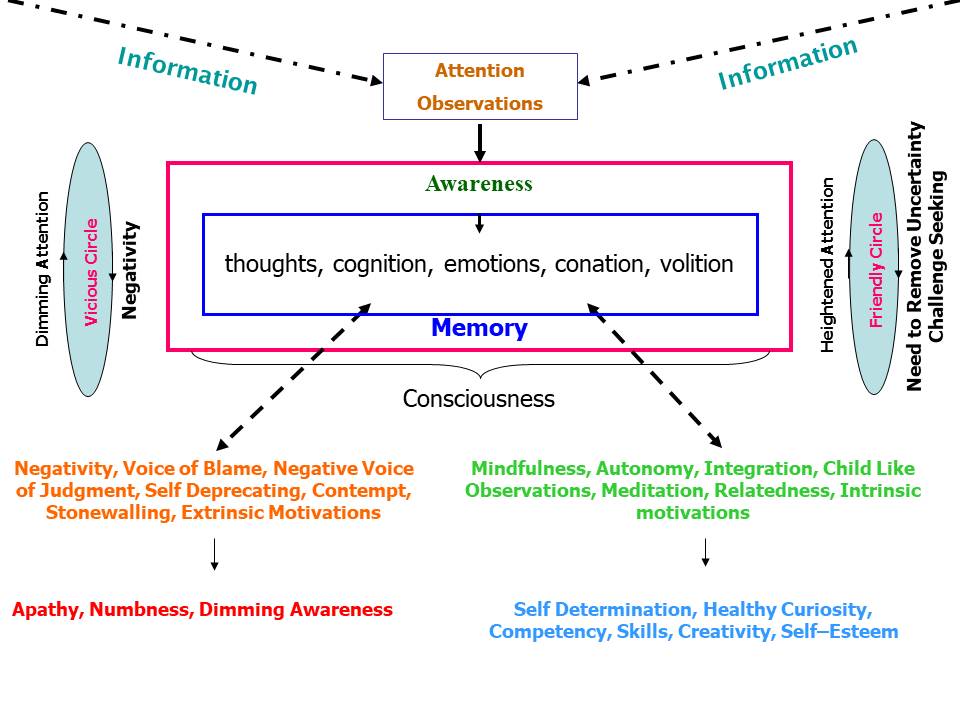First Chapter Section 5

The Power of Perspective: Transforming Awareness and Enhancing Life
Understanding the Effects of Negative Inputs
If your awareness inputs or outputs a voice of blame and negative judgment as a consequence of your life observations or experiences, you will output apathy, boredom, and helplessness. This leads to depression, as depicted on the left side of the figure with the vicious loop. These negative outcomes result from distorted views, perceptions, and previous programming (machinery).
Breaking the Vicious Cycle
Recognizing and Transforming Distorted Perceptions
To break free from this vicious cycle, you must recognize that these negative outcomes stem from distorted perceptions and past experiences. By acknowledging this, you can begin to alter your perspective and change the inputs to your awareness.
Embracing Positive Inputs and Machinery
When you change your observation (the input) and set up the new machinery of mindfulness, intrinsic motivations, autonomy, integration, relatedness, and creativity, you will achieve self-determination, healthy curiosity, competency, skills, self-esteem, choice, enjoyment of tasks, more defined goals, improved information gathering, and achievement orientation. This creates a positive, friendly, or virtuous circle, as illustrated on the right side of the picture.
The Key to Transformation: Altering Your Perspective
Changing Your Perspective
The key to transforming your awareness is to alter your perspective of the world around you. By changing how you perceive information, you can shift from negative to positive inputs, leading to healthier and more productive outputs.
Developing a Youthful and Naïve Frame of Mind
Developing a youthful and/or naïve frame of mind is an efficient approach to retrain your mind. This book will teach you how to build child-like observation abilities, child-like listening skills, child-like learning skills, and child-like connections (relatedness).
Externalizing and Mindfulness Techniques
Externalizing as a Therapeutic Strategy
Externalizing is a therapeutic strategy that encourages individuals to objectify and, at times, personify the oppressive conditions they encounter. This process helps people view the issue as a distinct entity external to themselves or their relationships. It allows them to observe their harmful behavior more objectively. This method is supported by spiritual pathways, meditation abilities such as awareness, and practices like yoga.
Mastering Spiritual Meditation
Insights Through Spiritual Meditation
When you master spiritual meditation, insights about yourself, your mind, and how it operates will burst into your head, especially regarding the negative side of your awareness (the left half of the diagram). This is when you can efficiently demolish negative patterns.
Achieving Mental Stability and Concentration
Through spiritual meditation, you can achieve mental stability and concentration, accurately detecting which components contribute to calmness and creativity. This practice is freeing and illuminating because it allows the release of negativity. Enlightenment entails cleansing your thinking and letting go of negative influences in your life. This approach is universally applicable and independent of any specific religion or spiritual path.
The Story of the Famous Rabbi
A Lesson in Spiritual Joy and Wisdom
There is an old story about a famous rabbi living in Europe who was visited by a man who had traveled from New York to see him. The man came to the rabbi’s large house in a European city and was directed to the rabbi’s room in the attic. He entered to find the master living in a room with just a bed, a chair, and a few books. The man had expected much more. After greetings, he asked, “Rabbi, where are your things?” The rabbi responded, “Well, where are yours?” His visitor replied, “But Rabbi, I’m only passing through,” and the master answered, “So am I, so am I.”
The Essence of Spiritual Joy and Wisdom
Spiritual joy and wisdom do not come through possessions but through our capacity to open our hearts, love more fully, and move and be free in life.
Living a Path with Heart
Creativity and Unique Gifts
A path with a heart includes our unique gifts and creativity. The outer expression of our hearts may involve writing books, building structures, creating ways for people to serve one another, teaching, gardening, serving food, or playing music. Whatever we choose, the creations of our lives must be grounded in our hearts. Love is the source of all energy to create and connect. Acting without a connection to the heart can lead to a life that feels dried up, meaningless, or barren.
Harmonious Development of the Mind
An enrichment of personality and a strengthening of character inevitably follow since the three basic elements of the mind—intellect, feeling, and will—will develop harmoniously. By integrating mindfulness, intrinsic motivations, and a positive perspective, you can foster a fulfilling and creative life, transforming challenges into opportunities for growth and enlightenment.
